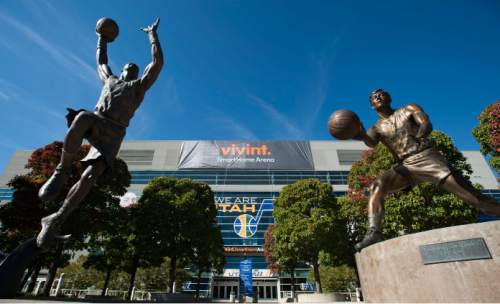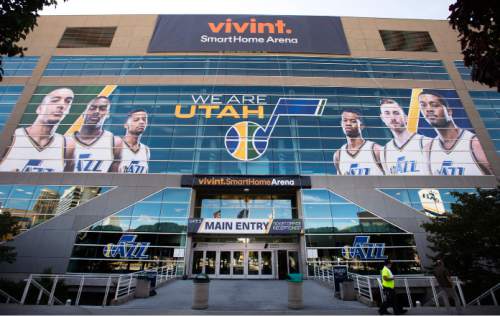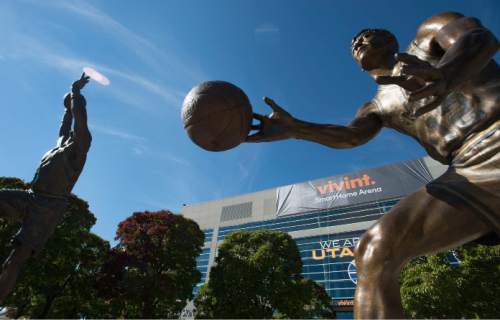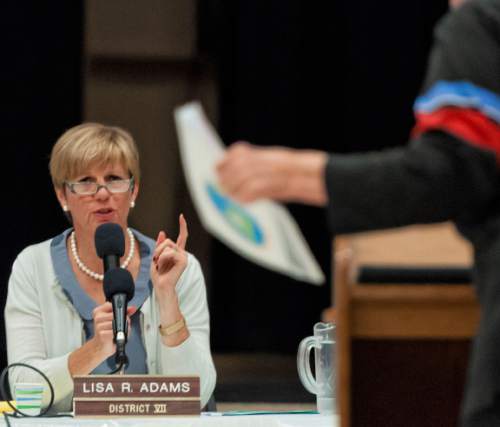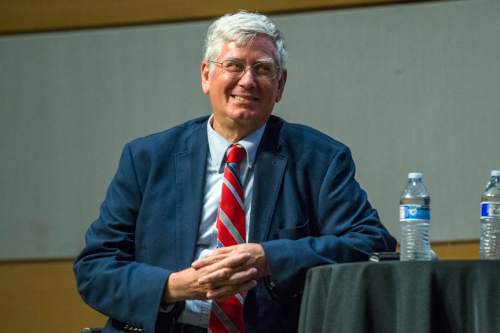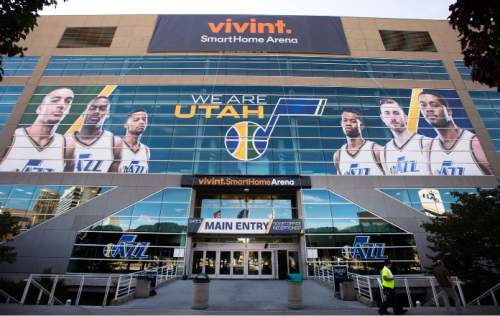This is an archived article that was published on sltrib.com in 2016, and information in the article may be outdated. It is provided only for personal research purposes and may not be reprinted.
A little more than two hours — that's how long the Salt Lake City Redevelopment Agency's public process lasted that resulted in approval of a $22.7 million subsidy for the Larry H. Miller Group's Vivint Smart Home Arena.
The RDA's unanimous vote to OK tax-increment financing over 25 years to cover part of the planned $110 million upgrade of the arena came Tuesday. It was the only time the item had appeared on any Salt Lake City agenda.
There was no public hearing, and the agenda wasn't posted until the day before, meeting the minimum requirement under Utah law.
The Salt Lake City Council also sits as the RDA board. Before the vote, freshman Councilman Andrew Johnston asked why the vote seemed rushed.
Two-term Councilman Stan Penfold responded by saying that the process was normal for such tax-increment financing contracts.
The issue only became public June 10, when The Salt Lake Tribune published a story on the proposal that would modernize the 25-year-old arena that is home to the Utah Jazz.
About $12 million of the city funding would come from a percentage of the increased property taxes the Miller Group would pay on the arena as a result of the improvements to the block. The company also would receive a projected $3.9 million from interest on that money.
The Miller Group also will get about $6.7 million — approximately $306,000 a year — from tax increment the RDA collects from other parts of the city's Central Business District project area.
At the RDA meeting, representatives of the Miller Group said the upgrade was necessary to stay competitive with other cities. And they presented data that show the arena is a powerful economic engine for Salt Lake City and surrounding area.
But it wasn't the first time the RDA had heard the pitch. Most of its members had one-on-one private briefings with Miller executives in weeks leading up to the vote.
Community activist George Chapman took issue with the process and lack of public participation at the Tuesday meeting. It looked like the decision was made behind closed doors, he said.
"This is a taxpayer-funded issue," he said in an interview afterward. "People should have had a chance to participate."
RDA Chairwoman Lisa Adams, who scheduled the presentation and the vote, said in an interview that if she had the chance to do it again, she would do it differently.
It would have been more appropriate if the board waited a month on the increment financing vote, she said in an interview.
"I will totally own that. … It was a rookie mistake," said Adams, who took over the chairmanship in January.
Adams said she was not pushed by the Miller Group but moved quickly because the Jazz owners wanted to begin work as soon as possible to avoid construction during the NBA season.
Are the transparency laws regarding RDAs adequate? That's the question pondered by state Sen. Deidre Henderson, R-Spanish Fork, an advocate for transparency in government.
"Do we need to ensure the public has more opportunity to comment on something of this magnitude?" she said, referring to redevelopment agencies. "Typically, the power of public hearings and public comment and airing grievances should not be circumvented."
Further, Henderson noted that an accelerated timeline can leave the public feeling the deal was done before a vote.
"The more people involved in a political process," Henderson said, "the better it is."
Freshman Councilman Derek Kitchen said the RDA did follow its process but more public participation may have been warranted.
"I noticed that people were caught off guard by this," he said. "I wouldn't argue against discussing our policy on this."
Johnston added that more time should be alloted on large issues that come before the RDA board in order to get public input.
Beyond that, he said he would like residents to get more information on how such tax-increment financing works. "A lot of [the public process] is education."
Mayor Jackie Biskupski, who campaigned on economic development and transparency, was not at the RDA meeting when the Miller Group made its presentation, nor when the vote was taken directly afterward.
Matthew Rojas, her spokesman, said although the mayor has taken the position of executive director of the RDA, she does not schedule meetings.
"The administration would like to see more transparency," Rojas said. "The public should feel their voice is heard on decisions like this."


